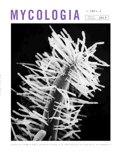
MYCOLOGIA
metrics 2024
Leading the way in interdisciplinary fungal studies.
Introduction
MYCOLOGIA, published by Taylor & Francis Inc, is a prestigious journal that has been at the forefront of fungal research since its inception, with converging years of publication from 1945 to 2024. This interdisciplinary journal, identified by ISSN 0027-5514 and E-ISSN 1557-2536, stands out in various scientific categories, achieving Q1 rankings in Ecology, Evolution, Behavior and Systematics, as well as Plant Science, alongside strong performances in Cell Biology and Molecular Biology categories. With an impact factor that reflects its significance in the field, MYCOLOGIA appeals to a diverse audience, including researchers, professionals, and students dedicated to advancing the understanding of fungal biology and its ecological implications. Notably, while it does not currently operate under an Open Access model, the journal remains a vital resource for those pursuing groundbreaking discoveries in mycology and related disciplines.
Metrics 2024
 0.81
0.81 2.60
2.60 3.00
3.00 128
128Metrics History
Rank 2024
Scopus
IF (Web Of Science)
JCI (Web Of Science)
Quartile History
Similar Journals
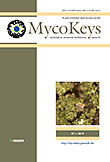
MycoKeys
Unlocking the secrets of fungi for ecological innovation.MycoKeys, published by PENSOFT PUBLISHERS, is a leading open-access journal dedicated to advancing the understanding of fungal biology and its diverse implications within agricultural, ecological, and biological sciences. With its ISSN 1314-4057 and E-ISSN 1314-4049, this journal has achieved remarkable academic prestige, reflected in its 2023 Scopus rankings placing it in the first quartile (Q1) across several categories, including Agricultural and Biological Sciences (miscellaneous), Ecology, Evolution, Behavior and Systematics, and Plant Science. MycoKeys provides a platform for researchers, professionals, and students interested in the latest findings and methodologies regarding fungi, their environments, and their interactions within various ecosystems. Since its transition to open access in 2011, the journal has championed the dissemination of high-quality research to a global audience, fostering collaboration and innovation in mycology. With a publishing history that converges from 2015 to 2024, MycoKeys remains a vital resource for those committed to exploring the multifaceted roles fungi play in our world.

MYCOSCIENCE
Cultivating Understanding of Fungi's Ecological ImpactMYCOSCIENCE, published by the Mycological Society of Japan, is a prominent peer-reviewed journal that serves as an essential resource in the fields of ecology, evolution, behavior, and systematics, highlighted by its Q2 ranking in the 2023 category quartiles. Established in 1994 and continuing through 2024, the journal focuses on mycological research, providing insights into the interconnected worlds of fungi and their ecological roles. With an ISSN of 1340-3540 and an E-ISSN of 1618-2545, MYCOSCIENCE aims to disseminate high-quality research that addresses current issues and trends within the discipline. Despite not being an open-access journal, it makes a significant contribution to advancing fungal biology and its applications in agriculture and environmental science, making it an invaluable asset for researchers, professionals, and students alike. Located in the vibrant academic environment of Tokyo, Japan, MYCOSCIENCE stands out for its dedication to fostering a deeper understanding of mycology and its implications for biodiversity and ecosystem health.
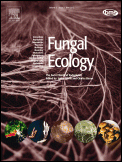
Fungal Ecology
Exploring the Intricacies of Fungal InteractionsFungal Ecology, published by Elsevier Science Ltd, is a leading international journal dedicated to the exploration and advancement of our understanding of fungal biology and its ecological significance. With an impressive impact factor and recognized in the second quartile (Q2) across various categories such as Ecological Modeling, Ecology, Ecology, Evolution, Behavior and Systematics, and Plant Science, this journal offers a critical platform for researchers and professionals to disseminate and discuss innovations in fungal ecology. Since its inception in 2008, the journal has built a solid reputation, particularly highlighted by its impressive Scopus rankings, including a top percentile status in ecological fields. Researchers are encouraged to submit their findings that contribute to the understanding of the ecological roles of fungi, their interactions within ecosystems, and their applications in environmental science. Although the journal does not offer open access, it remains a vital resource for academics and practitioners aiming to stay ahead in the rapidly evolving fields of fungal research and ecology. Located in the vibrant heart of the Netherlands, the journal continues to foster scholarly engagement and collaboration among scientists globally.
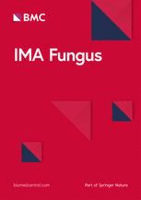
IMA Fungus
Advancing Knowledge in Fungal and Plant Sciences.IMA Fungus is an esteemed open-access journal published by BMC, dedicated to advancing research in the fields of fungi, plant sciences, and ecological systems. With an ISSN of 2210-6340 and E-ISSN 2210-6359, this journal has been an influential platform since its inception in 2010, contributing significantly to the scientific community in the United States and beyond. The journal’s remarkable impact can be seen in its Q1 quartile rankings across multiple categories, including Agricultural and Biological Sciences, Ecology, Evolution, Behavior and Systematics, and Plant Science, positioning it among the top literary sources in these fields. Notably, IMA Fungus holds impressive Scopus rankings, with the Agricultural and Biological Sciences category placing it in the 98th percentile, evidencing its crucial role in disseminating impactful research. Given its commitment to fostering accessibility and collaboration, IMA Fungus continues to be an invaluable resource for researchers, professionals, and students aiming to explore and understand the complex roles of fungi within various ecosystems.
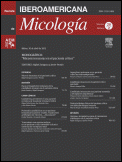
REVISTA IBEROAMERICANA DE MICOLOGIA
Illuminating the World of Fungi and Their ImpactREVISTA IBEROAMERICANA DE MICOLOGIA, published by the ASOCIACION ESPANOLA MICOLOGIA-AEM, is a vital resource for those engaged in the study of mycology and infectious diseases. With a history spanning from 1996 to 2024, this journal is committed to advancing knowledge in the field through the dissemination of high-quality research articles, reviews, and case studies. Although it currently features a Q3 ranking in Infectious Diseases and a Q4 ranking in Microbiology for 2023, its impact is significant given the niche focus it serves, catering to a specialized audience of researchers and practitioners. While access is not open, the journal continues to be a preferred platform for scholarly communication among professionals in Spain and beyond. The editorial office, located in Bilbao, serves as the hub for rigorous peer-review and publication processes, ensuring that the latest advancements and findings in the field of mycology are effectively shared within the scientific community.
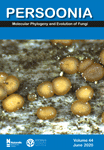
PERSOONIA
Innovating Research in Systematics and BotanyPERSOONIA, a distinguished journal published by RIJKSHERBARIUM, serves as a pivotal platform for the dissemination of high-quality research in the fields of Ecology, Evolution, Behavior, and Systematics, as well as Plant Science. Established with a commitment to advancing scientific knowledge, PERSOONIA has achieved an impressive Q1 ranking in these areas, highlighting its significant impact within the academic community, as evidenced by its ranking of #12 out of 721 journals in its field, placing it in the top 2% of publications. With a publication history that spans from 1996 to present, the journal regularly features innovative studies that push the boundaries of understanding in ecological and botanical sciences. While Open Access options are currently limited, researchers and professionals alike benefit from subscription access to this vital resource. Located in the Netherlands, PERSOONIA continues to be a beacon for scholars aiming to enrich the discourse in evolving ecological and plant science disciplines.

NEW ZEALAND JOURNAL OF BOTANY
Cultivating Insights into New Zealand's Unique FloraThe New Zealand Journal of Botany, published by the esteemed Taylor & Francis Ltd, serves as a pivotal platform for disseminating significant research in the fields of Ecology, Evolution, Behavior and Systematics, as well as Plant Science. With a rich history dating back to 1963 and an impressive convergence extending to 2024, this journal has established itself as an essential resource for researchers and professionals dedicated to understanding the complexities of plant life and ecological systems in New Zealand and beyond. The journal is currently categorized in the Q3 quartile for both relevant disciplines as of 2023, reflecting its balanced influence within the global academic community. Although not an open access journal, it retains a significant impact factor, evidenced by its Scopus rankings, which place it within the top half of its categories. This makes it an invaluable tool for students, researchers, and academics aiming to engage with robust, peer-reviewed scientific findings and contribute to the evolving discourse surrounding botany and ecological research.
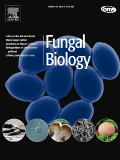
Fungal Biology
Exploring the Intricacies of Fungal LifeFungal Biology, published by Elsevier Science Ltd, is a premier journal dedicated to advancing the field of mycology and its interdisciplinary applications. With an ISSN of 1878-6146 and E-ISSN 1878-6162, this journal serves as a vital platform for researchers and professionals interested in the ecological, evolutionary, and genetic aspects of fungi, as well as their implications in infectious diseases and plant sciences. As of 2023, it proudly holds a Q2 ranking in Ecology, Evolution, Behavior and Systematics and Plant Science, and a Q3 ranking in Genetics and Infectious Diseases, highlighting its significant contribution to these domains. The journal boasts an impressive Scopus rank, including a percentile of 83rd in Ecological studies, ensuring that published research reaches a wide audience and impacts ongoing discourse in the field. With open access options, Fungal Biology encourages the dissemination of high-quality research, aimed to foster collaboration and innovation among scholars and practitioners. With its convergence of knowledge from 2010 to 2024, this journal is instrumental for those advancing the understanding of fungal biology and its myriad applications in environmental and health sciences.

Frontiers in Fungal Biology
Advancing Mycology Through Innovative ResearchFrontiers in Fungal Biology is an innovative academic journal dedicated to advancing the field of mycology and its interdisciplinary connections, published by FRONTIERS MEDIA SA. With an E-ISSN of 2673-6128, this journal focuses on exploring diverse aspects of fungal biology, including ecological roles, evolutionary processes, and interactions with other organisms. Since its inception in 2020, Frontiers in Fungal Biology has garnered attention within the scientific community, earning a commendable Q2 ranking in both Ecology, Evolution, Behavior and Systematics, and Environmental Science categories in 2023, alongside respectable Q3 rankings in Infectious Diseases and Microbiology. The journal is committed to open access principles, making cutting-edge research freely available to a global audience, promoting knowledge sharing and collaboration. By providing a platform for rigorous research and impactful discussions, Frontiers in Fungal Biology aims to enhance the understanding of fungi and their significant roles in ecosystems, health, and biotechnology, appealing to researchers, professionals, and students alike.
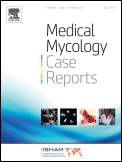
Medical Mycology Case Reports
Empowering practitioners with essential mycological knowledge.Medical Mycology Case Reports, published by Elsevier, is a pivotal journal dedicated to advancing the field of mycology through the presentation of case reports that highlight clinical findings, diagnostic challenges, and treatment outcomes associated with fungal infections. With its ISSN 2211-7539 and E-ISSN 2211-7539, this open-access journal has been serving the global community since 2012, allowing unrestricted access to its valuable insights. Situated in the Netherlands, specifically at RADARWEG 29, AMSTERDAM, this journal has gained recognition in areas such as Infectious Diseases (ranked Q3) and Microbiology (ranked Q4) as of 2023. Its commitment to disseminating high-quality research is reflected in its Scopus rankings, which place it at the 51st percentile in Medicine and the 32nd percentile in Immunology and Microbiology. By bridging the gap between clinical cases and academic research, Medical Mycology Case Reports plays a crucial role in enriching the knowledge base of practitioners and researchers alike, ultimately contributing to improved patient management and public health.